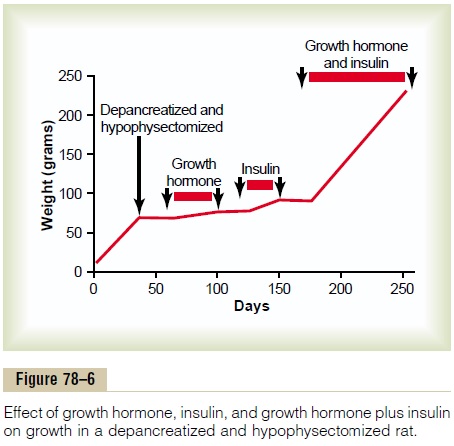Chapter: Medical Physiology: Insulin, Glucagon, and Diabetes Mellitus
Effect of Insulin on Protein Metabolism and on Growth
Effect of Insulin on Protein Metabolism and on Growth
Insulin Promotes Protein Synthesis and Storage. During thefew hours after a meal when excess quantities of nutri-ents are available in the circulating blood, not only car-bohydrates and fats but proteins as well are stored in the tissues; insulin is required for this to occur. The manner in which insulin causes protein storage is not as well understood as the mechanisms for both glucose and fat storage. Some of the facts follow.
1. Insulin stimulates transport of many of the amino acids into the cells. Among the amino acids moststrongly transported are valine,leucine, isoleucine, tyrosine, and phenylalanine. Thus, insulin shareswith growth hormone the capability of increasing the uptake of amino acids into cells. However, the amino acids affected are not necessarily the same ones.
2. Insulin increases the translation of messenger RNA, thus forming new proteins. In someunexplained way, insulin “turns on” the ribosomal machinery. In the absence of insulin, the ribosomes simply stop working, almost as if insulin operates an “on-off” mechanism.
3. Over a longer period of time, insulin alsoincreases the rate of transcription of selected DNA genetic sequences in the cell nuclei, thus formingincreased quantities of RNA and still more protein synthesis—especially promoting a vast array of enzymes for storage of carbohydrates, fats, and proteins.
4. Insulin inhibits the catabolism of proteins, thusdecreasing the rate of amino acid release from the cells, especially from the muscle cells. Presumably this results from the ability of insulin to diminish the normal degradation of proteins by the cellular lysosomes.
5. In the liver, insulin depresses the rate of gluconeogenesis. It does this by decreasingthe activity of the enzymes that promote gluconeogenesis. Because the substrates most used for synthesis of glucose by gluconeogenesis are the plasma amino acids, this suppression of gluconeogenesis conserves the amino acids in the protein stores of the body.
In summary, insulin promotes protein formation and prevents the degradation of proteins.
Insulin Lack Causes Protein Depletion and Increased Plasma Amino Acids. Virtually all protein storage comes to ahalt when insulin is not available. The catabolism of proteins increases, protein synthesis stops, and large quantities of amino acids are dumped into the plasma. The plasma amino acid concentration rises consider-ably, and most of the excess amino acids are used either directly for energy or as substrates for gluco-neogenesis. This degradation of the amino acids also leads to enhanced urea excretion in the urine. The resulting protein wasting is one of the most serious of all the effects of severe diabetes mellitus. It can lead to extreme weakness as well as many deranged func-tions of the organs.
Insulin and Growth Hormone Interact Synergistically to Promote Growth. Because insulin is required for the synthesis ofproteins, it is as essential for growth of an animal as growth hormone is. This is demonstrated in Figure 78–6, which shows that a depancreatized, hypophysec-tomized rat without therapy hardly grows at all. Furthermore, the administration of either growth hormone or insulin one at a time causes almost no growth. Yet a combination of these hormones causes dramatic growth. Thus, it appears that the two hor-mones function synergistically to promote growth, each performing a specific function that is separate from that of the other. Perhaps a small part of this necessity for both hormones results from the fact that each promotes cellular uptake of a different selection of amino acids, all of which are required if growth is to be achieved.

Related Topics